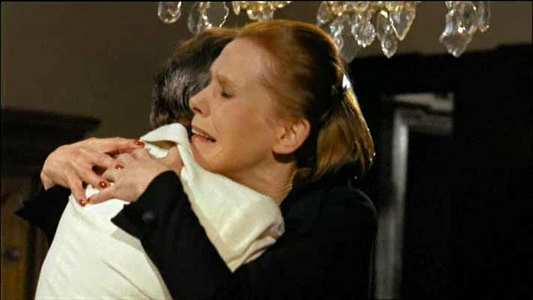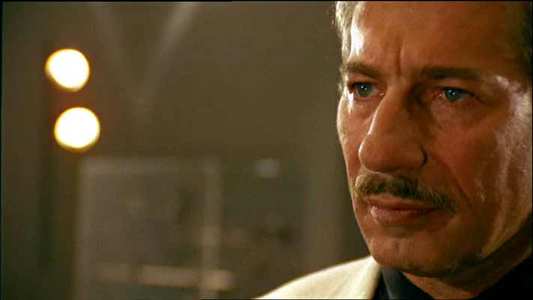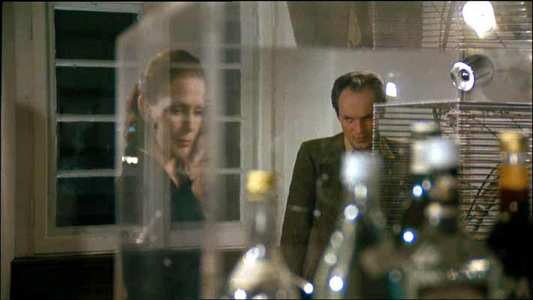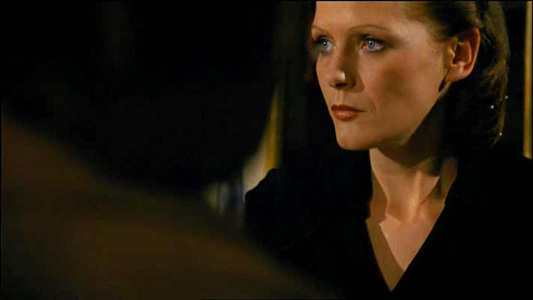Review of R.W. Fassbinder Collection - 1973-1982
Introduction
Fassbinder is maybe the coolest German auteur, adored in the US where major exhibitions and events have been held in his honour. Although spiritually this is pure art house, in the same vein as Godard or Warhol, Fassbinder`s work is fastidiously planned and executed, and is relatively easy to watch, despite its explorations of some fairly tough terrain and apparent use of ad-libbed dialogue. Throughout, there is a depressing existentialist sense of hopelessness, and an often claustrophobic lethargy that shows his characters stuck in a rut, where there is little point in changing anything.
In the few brief years of his career he was remarkably prolific. Though finance was a constant problem, every penny he made or encouraged others to give went into his work. Fassbinder was one of several Directors commonly referred to as the `New German Cinema` of the late 1960`s and early 1970`s, alongside Wim Wenders (Paris, Texas) and the equally prolific Werner Herzog (Nosferatu).
He was clearly a complex and gifted character, openly gay and yet also married for a time to one of his leading ladies. He initially started his own theatre group in Bavaria where he wrote, produced, directed and acted; a pattern he would continue with his film-making. The influence that theatre had on his film-making is often evident, with much of the action taking place in carefully composed long, wide shots with little editing. As luck would have it, this preference was also a practical blessing meaning that Fassbinder shot economically, rarely wasting money on superfluous film stock. In other words, he achieved an amazing bang for his limited buck.
A self-destructive character, he died in 1982 of a drug overdose at the tender age of 37, having turned in some 40 films, as well as a TV series - all created in just over a decade. In truth, in some of the interview footage, he appears older than these tender years, a slightly tortured soul with the weight of a confusing world on his shoulders.
This second set of his movies covers the mid to late period of his work where, despite working to the same frenetic schedules as ever, Fassbinder had built up enough of a reputation to be able to raise a modicum more budget.
Despite a dalliance with Hollywood and some more straightforward narrative than some of his earlier works, all the usual themes are alive and well, with eight movies presented across 8 discs, with some pretty substantial extras.
Here`s what you get:
Fear Eats The Soul (1974)
Fontane Effi Breist (1974)
Fox And His Friends (1975)
Mother Küsters Goes To Heaven (1975)
Fear Of Fear (1975)
Satan`s Brew (1976)
Chinese Roulette (1976)
The Marriage of Maria Braun (1979)
FEAR EATS THE SOUL (1974)
Fassbinder was spellbound by Douglas Sirk and there`s no mistaking this direct and thinly disguised reworking of the great man`s `All That Heaven Allows`.- which Fassbinder freely admitted. Dealing with the same issues of racism and snobbery, Fassbinder also produces a melodrama but replaces Sirk`s predictable line-up with an elderly German ex-Nazi cleaning lady who has fallen in love with a young Moroccan, a `second class` immigrant worker. Her family are not amused, and her children reject the lover as well as disowning their own Mother. Whether it will work out or not is irrelevant to Fassbinder who is far more interested in provoking a reaction - from the society portrayed in the film and from the audience of the picture itself. There`s nothing glossy about the characters here. They`re far from perfect. It`s a film that raises many more questions than it answers and is a gritty, street-wise version of Sirk`s original theme and narrative.
FONTANE EFFI BREIST (1974)
This is a period piece based on Theodore Fontane`s 19th Century classic. A young lady is married to a rather cold Baron, and when he`s away on business she begins an affair with a handsome Major. She`s torn between what she feels is the `right thing to do` and what her heart is telling her to do. In the event, she is discovered and no one around her seems to have the least sympathy for her predicament; neither her husband, parents, friends or colleagues. But, as Fassbinder is telling us, life is like that. This is a really beautiful looking film, shot in black and white, with a strangely formal air - not unlike a Jane Austen piece, where much is discussed and referred to, though little actually seen. It`s simmeringly understated, where the emotions are rarely displayed though clearly evident behind the eyes of a very capable cast.
FOX AND HIS FRIENDS (1975)
Classic Fassbinder territory here with Fassbinder himself playing the part of the forever frustrated Franz - or `Fox` of the title. The police shut down the fairground where Franz has been working as `Fox the Talking Head`. Rather than feel down he decides to find some money and buy a lottery ticket and obviously win a fortune. Bizarrely, the long shot works and he scoops the half million jackpot. Through Max, a `friend`, he has met a circle of wealthy young `queers`, but though he is now wealthy, he never quite fits in. He falls hopelessly in love with Eugen (Peter Chatel) who works at a local printing firm in a managerial position. But it`s soon obvious that Eugen is merely using Franz in an effort to keep his ailing business afloat with Franz`s new found wealth. The film is full of toe-curling social gaffes as Franz sets out to impress at the very finest restaurants, revealing his working class roots at every twist. It`s an uncomfortable watch, revealing for the viewer all the cruel social prejudices that many of us hold.
MOTHER KÜSTERS GOES TO HEAVEN (1975)
Frustrated and demented, a factory worker (Hermann Kusters) goes beserk, beating the son of a factory owner to death before taking his own life. His remaining family have no idea what may have driven him to such extremes, though following an interview with his wife, the press publish a salacious and inaccurate view of the facts. They claim that he had been a big drinker who would indiscriminately beat his own children and wife. The wife (the `Mother` of the title) finds sympathy for her husband`s actions from communist neighbours, and before long his great wrong starts to feel like a noble act. Even her own daughter, Corrina, who is a nightclub singer, gets in on the act, exploiting her situation to the full.
It seems that even a random and desperate act can be used to some advantage, and that everyone is out to get something for themselves. Though this sounds like a very bleak melodrama, there is much here that Fassbinder is getting off his own chest. Both the exploitation of his own infamy from those around him and the clear distortions of the press are just two such areas.
FEAR OF FEAR (1975)
This was made specifically for German TV and as a consequence has had to tone down the rougher edges that previously marked Fassbinder`s work. That said, this is hardly light entertainment, portraying as it does the deep misery that depression can cause and a slow descent into a kind of madness. A housewife, Margot, is expecting her second child but is experiencing panic attacks and is gripped by an unknown fear, a kind of existential meltdown. Even after the birth, her behaviour continues to worry those around her. The fear turns into paranoia where she becomes progressively defensive and where she sees menace at every turn. Drugs don`t help, alcohol doesn`t help - and event extra-marital affairs don`t help. Soon the neighbours are whispering, the in-laws are on her back and a feedback loop of fear causing further fear draws her ever deeper into a downward spiral. Fassbinder himself suffered from chronic insomnia and a desperate fear of death, often referencing this fear as a driver of his prolific workload. Despite being made for TV, this film still packs a punch though some may find the score a little dated.
SATAN`S BREW (1976)
Fassbinder was fascinated with the tortured and difficult artist - seeing himself through other`s eyes. `Satan`s Brew` was firmly autobiographical to a degree and maybe as a consequence has plenty of humour. Walter Kranz (Kurt Raab) is a very average but clearly deluded poet who has no money and no work likely to get him any. So he sweet talks a rich lover into signing a cheque before he kills her in a kinky sex session. Suffering from writers block he hires a prostitute to do some research for him but the work it inspires ends up being frighteningly similar to that of a homosexual classicist. Naturally, that raises some difficult questions for Walter. With more in common with Monty Python, and reflecting the free-abandon of the period, we`re then treated to a film full of explicitly kinky sex acts and plenty of nudity as Walter surrounds himself with sympathetic participants in his self-indulgent (but ultimately pointless) lifestyle.
CHINESE ROULETTE (1976)
Yet another momentous pop at the German middle-classes, `Chinese Roulette` uses some almost Brian Rix like farce to create the setting for this grotesque movie to be played out. Thinking that his wife is away on business, Gerhard, who is supposed to be in Oslo himself, decides to meet up with is French Mistress, Irene, at the family weekend retreat. Only his wife, Ariane, is up to the same thing and is also at the country home with here secret lover, Kolbe. Normally, the servants would ensure that no such clash of itineries would occur, but this time the servants disabled daughter, Angela, has decided to engineer the whole embarrassment as a way to get revenge on her parents who she believes are fully responsible for her being crippled. The whole film is wrigglingly awkward and a game of `Chinese Roulette` allows the truth to out. Whilst it`s all a little stagy and `convenient`, it does succeed in exploring the motivations and concerns of the central characters as the dirty linen is washed in public.
THE MARRIAGE OF MARIA BRAUN (1979)
This film sees Fassbinder back in historical mode, once again paying homage to Sirk`s post-war melodramas. Set during the war, the film gets off to an explosive start as the wall of a Berlin registry office is blown away just as an Army Officer and his bride tie the knot. Literally struggling through the rubble to get the marriage licence signed, it`s clear that Maria is a determined and courageous individual. Despite being told by all around her in this crumbling and occupied city that Love is `not a truth`, Maria` spirit will not let her accept this cynical and beaten-down view of the world. Perhaps the film can be seen as Fassbinder`s admiration for those who, despite all evidence to the contrary, remain optimistic and positive, a quality that Fassbinder himself lacked absolutely.

Video
As in the first set, the results here are a little variable. Most the films are 4:3 though in truth Fassbinder often worked with TV composition in mind. Working with some very decent cameramen, the films here look generally impressive with lovely, filmic colour in most instances.
In general the prints used are in good shape and the transfers nicely done with the possible exception of `Fear of Fear` which looked a little soft and washed out.

Audio
Generally, Dolby Digital 2.0 mono, and all perfectly adequate if unremarkable.

Features
TRAILERS
There are trailers advertising the other movies in the set revealing their `single disc` status on original release.
FASSBINDER (57:05)
This is a film by Robert Fischer exploring the incredible influence that US Cinema had on Fassbinder, who often stole genre cues (Film Noir for example) wholesale - though it`s never clear in his films whether this reflects their influence on the characters in his films or on Fassbinder himself. Featuring interviews with Wim Wenders (who considers all the wonderful films that Fassbinder might have made were he still alive and kicking), Michael Ballhaus, Uli Lommell and Hanna Schygulla, it also offers a small insight into the brief dalliance that Fassbinder did enjoy with Hollywood. It`s notable that when others criticised Fassbinder for accepting Hollywood finance, saying he would lose his creative freedom, he merely commented that he had never enjoyed creative freedom anyway, with strict censorship prevailing in his native Germany preventing many of his early outings getting the exposure they perhaps deserved. All in all a very nice addition to the set.
LIFE STORIES: A CONVERSATION WITH RAINER WERNER FASSBINDER (48:29)
This awkwardly invasive German interview from 1978 sees Fassbinder letting loose (between cigarettes) almost as if he is in the Psychiatrists chair. Lasting almost an hour, it`s an intensely personal interview and gives amazing insight into Fassbinder and his work. Absolutely fascinating.
TEH CITY TRAMP (11:27)
This is a nice addition; Fassbinders first film from 1966 which is a short featuring a homeless man who finds a gun on the street (temptation and opportunity) but can`t bring himself to use it or get rid of it. It`s a very nice debut.
TODD HAYES INTERVIEW (15:12)
Director of the Douglas Sirk copycat melodrama `Far From Heaven` compares both approaches to the theme.
FASSBINDER FAMILIA
Filmographies and photos of 15 of Fassbinder`s regular cast.
FASSBINDER FRAUEN - THE WOMEN OF RAINER WERNER FASSBINDER (25:21)
Actually a promotional piece for an exhibition at the Pompidou, this draws together the diverse and often disturbing scenes that Fassbinder puts his female cast members through, sometimes nudging the edges of misogyny. The more abusive and cruel aspects are countered by glamorous revealing a contradictory portrayal of women in his films.
RAINER WERNER FASSBINDER 1977 (29:09)
This is a brief interview filmed in 1977 by German Florian Hopf, where Fassbinder discusses theatre, filmmaking and where he sits in relation to younger filmmakers emerging.
THE LITTLE CHAOS(9:20)
This was Fassbinder`s second movie (just a short) and it betrays some early outings of familiar themes, with Fassbinder himself acting like a film noir gangster hood. Worth a look if just for context.

Conclusion
I suppose there`s not much point in saying that set is not exactly a barrel of laughs. Those interested in Fassbinder will know that already and will already be looking for a more meaningful set of films than, say, the `Police Academy` box set. Not always an easy watch, the films nonetheless collectively deliver a very satisfying sense of depth and their thought-provoking themes and questions will be with you for weeks, delivering a good return for the effort involved in watching them.
But it`s not all tough medicine. In common with Godard or Bergman, there are plenty of straight-forward narratives told by way of good old fashioned film-making.
Though this second set claims to cover the period after the first set (1973) up until Fassbinder`s untimely death in 1982, it actually covers the period from 1974 to 1979 only.
Compared to the first set, this gives a good indication of the sheer range of approaches that Fassbinder was able to master, making me wonder what other great works might he have achieved if he had lived beyond those initial 37 short years. There`s classic melodrama here, alongside historical drama, psycho-thriller and even surrealistic farce.
Overall, the set is nicely transferred with clean prints and little artefacting, and the extras are really very worthwhile, giving some excellent context to the works, particularly useful for anyone studying the man and his work.
You`ll know already whether slightly more challenging cinema is your thing. If it is then I`m pretty sure that you`re going to really enjoy owning this (and the previously issued Volume 1) box set.
Your Opinions and Comments
Be the first to post a comment!